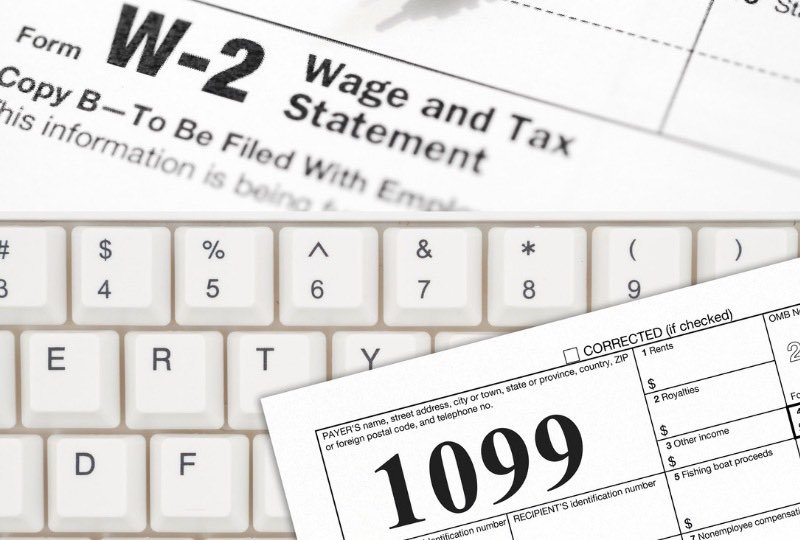
By alphacardprocess February 3, 2022
Identifying the difference between W-2 employees and 1099 workers, including common classifications in each category, is essential in ensuring that you can properly meet your tax obligations. Although there are several ways that the Internal Revenue Service (IRS) categorizes workers for tax purposes, understanding the distinction between W-2 employees and 1099 contractors is vital to understanding the difference between how each worker is taxed.
The IRS Taxes W-2 Employees and 1099 Contractors Differently
Each category of worker has a different standard for how taxes are handled, so it’s important that you understand the differences in order to ensure that your tax filings are accurate. W-2 employees can be taxed at the state and federal level, though withholding happens automatically through tax deductions. You are required to file taxes on behalf of W-2 employees by January 31st each year if you’re a business with an annual gross income of $500,000 or more.
Those who don’t meet this threshold must file W-2 forms within 30 days of the end of the first quarter if they have one or more W-2 employees. 1099 contractors, on the other hand, are responsible for filing their own taxes and ensuring that any necessary payments are made to the IRS.
How You Can Tell Which Category a Worker Falls Under?
It can be difficult to determine if someone is an independent contractor or an employee. The IRS allows workers to file as either, while many companies incorrectly classify their employees as 1099 contractors so that they can reduce their tax responsibilities. There are certain factors you should consider when determining the status of your workers in order to ensure that you aren’t committing any tax fraud.
One important factor is how much control you have over the worker; if you dictate when they work and how they do their job, then they’re more likely to be classified as an employee. The nature of your relationship with a worker is also considered in determining whether or not a company is liable for that individual’s taxes. If your business hires an independent contractor, then it shouldn’t be financially responsible for their behavior. IRS rules state that you are not liable for taxes on 1099 workers if the following is true:
- The worker provides his or her own tools.
- The contractor works for multiple clients at the same time. If this is the case, then you shouldn’t have any control over how they spend their day.
- The worker is responsible for their own insurance. In other words, if they get injured on the job, then it’s their responsibility to cover medical costs.
- The contractor has a business license and the appropriate legal paperwork. This can include a company registration, a DBA form or a home business permit. If they don’t have any of the required documentation from the IRS, then it may be difficult for you to determine their status.
- The contractor is a professional in his or her industry. For example, if they’re a doctor, then you can assume that they have a DBA form on file with the licensing board because it’s necessary for them to practice medicine.
What Are the Tax Responsibilities of W-2 Employees and 1099 Contractors?
When it comes to taxes, both employees and contractors are responsible for their own withholding. However, contractors can take additional deductions that aren’t available to workers earning a W-2 wage. For example, they might be able to deduct transportation costs or home office expenses. Since 1099 workers have to file their own taxes, they only pay the amount of taxes that is determined by how much money they earned minus any deductions. In other words, if you provide a contractor with a 1099 form and you report how much money they made to the IRS, then you shouldn’t have to worry about paying any taxes on their behalf.
If you’re unsure whether or not someone is an independent contractor, then it’s best to consult with a tax professional or legal representative before withholding any taxes from their paycheck. The IRS offers additional resources for those who are confused about how they should handle shared employees, and you can learn more about the agency’s guidelines for workers with multiple employers.
How to File Your Taxes as a 1099 Contractor?
If you are an independent contractor, then it is your responsibility to file your own tax returns on time every year. By doing so, you give yourself the chance to save money for future tax seasons by taking all of the deductions that apply to you. Filing your tax return is a fairly simple process that can be completed from the comfort of your living room, and there are many helpful resources available online to answer any questions you might have about how to file as a 1099 contractor.
